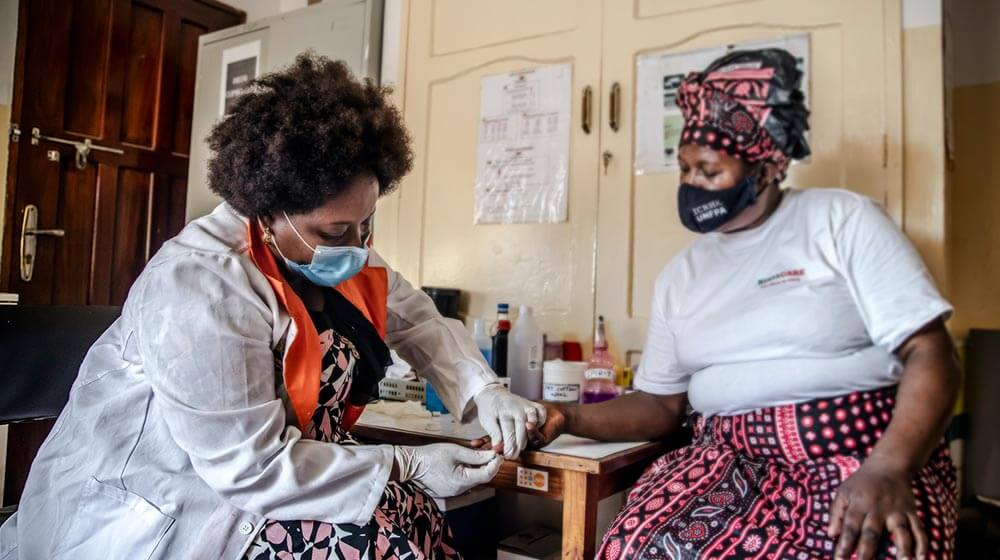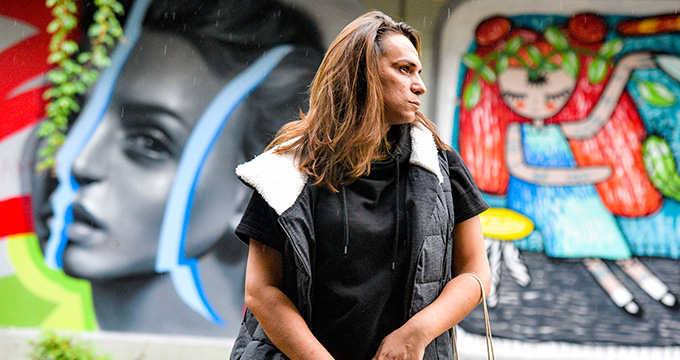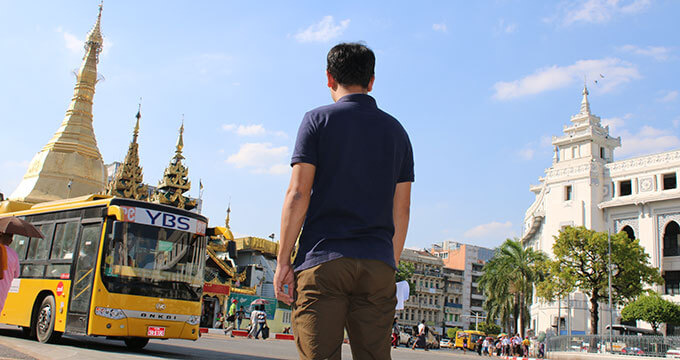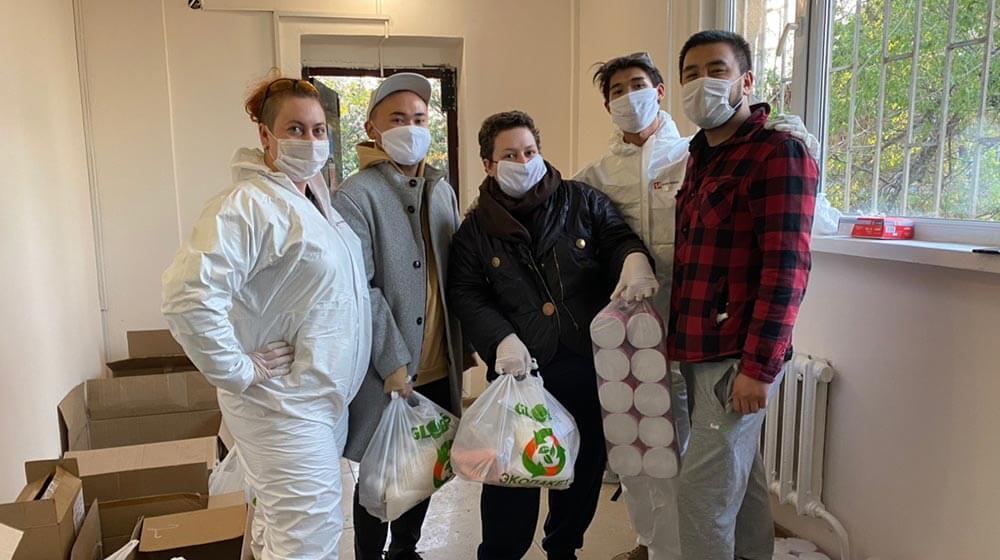Like Everyone Else, Sex Workers Deserve Health Care

Sex workers are a diverse group of people. They are men, women, and transgender people. Some are parents, members of religious groups, and members of our communities. Some sex workers enjoy their work and see it as a way to express their sexuality. Others like the income and flexibility. Others view sex work as their best available option to earn an income. Yet, whoever sex workers are and whatever they do, they deserve the same protections as everyone else. This includes the right to health care, to safety, and to their wages. UNFPA works with sex workers and with sex worker-led organizations to meet the needs of this often stigmatized and vulnerable population.
Stigma Against Sex Workers

Stigma against sex workers leads to extreme barriers to health care. For example, Lila in North Macedonia is transgender and a sex worker. One night, three of her clients attacked and raped her. Even though she endured a horrendous crime, she was afraid to see a doctor because she had witnessed discrimination from health-care workers first-hand. When her friend, also a sex worker, fell ill, doctors refused to address her concerns. Instead, Lila says, “They called a gynecologist to determine if my friend had genital injuries, and performed HIV and STI tests without her permission… To this day, I do not use public health services.”
Lila and her friend are not alone. A UNFPA report found that nearly 1 in 4 sex workers have been denied health care because of their occupation. And, not surprisingly, more than 60% of sex workers fear and distrust health care workers so much that they have someone accompany them to the doctor’s office. However, health care workers aren’t the only people who stigmatize and harm sex workers.
Police officers around the world are known to harass, violate, and arrest sex workers. However, because police officers are part of the justice system and because prostitution is criminalized in most countries, it can be difficult for sex workers to report crimes against them, including assault or theft. Just like everyone else, sex workers deserve fair access to health and safety services without judgment or punishment.
Sex Workers are 30x more likely to be HIV+

The stigma around sex work and its criminalization places sex workers in vulnerable positions. It is because they are less able to access services like health care that sex workers are 30 times more likely to be HIV+ than the general population. This likelihood is not attributed to irresponsible behavior. Rather, sex workers face high rates of violence and, for example, can be exposed to HIV during a sexual assault by a client. In Haiti, UNAIDS found that 36.6% of women who do sex work report physical violence and 27.1% report sexual violence. It should also be noted that because sex workers are so marginalized, reporting on the sex workers can have a range of accuracy. By destigmatizing this group, agencies like UNFPA are better able to assess and address the needs of sex workers.
In places where sex work is criminalized, police have used condoms as evidence of sex work. To avoid arrest, some sex workers have engaged in unprotected sex with clients, increasing their risk of HIV infection. COVID-19 lockdowns and restrictions have made in-person sex work more difficult or impossible. This has made sex workers more dependent on the clients they do have, decreasing sex workers’ ability to set boundaries. One sex worker told UNFPA, “Female sex workers have not been able to negotiate terms for sex because they are afraid of losing clients, but have engaged in sex without condoms just to have money.” These are just some factors that put sex workers at higher risk for HIV.
Sex Workers Face Extreme Discrimination

Image courtesy of Kyrgyz Indigo.
Sex workers also need food, shelter, and safety, just like everyone else. But stigma and lost income has left some sex workers homeless, hungry, and vulnerable to violence. In Kyrgyzstan, Alina‘s family rejected her because she is a transgender woman. She became a sex worker after jobs rejected her because her identity did not match her legal documents.
Now that Alina’s community is under lockdown, she and other sex workers have no income. She cannot get groceries, pay rent, or afford health care, including testing for COVID-19. She is unable to isolate safely, which increases her risk of catching and spreading COVID-19. UNFPA is working with Kyrgyz Indigo, an LGBTQI+ organization, to support Kyrgyzstan’s queer community. This includes providing groceries and medicines, like antiretrovirals for those living with HIV and hormone therapy for transgender people. UNFPA is also working to train health care staff on non-discrimination. Every person has a right to health care without fearing poor treatment by those who have power over their health.
The Impact of COVID-19 on Sex Workers

The COVID-19 pandemic has been particularly difficult for people whose only income is sex work. Hamida in Nigeria was only 12 years old when her family married her to a man in his 30s. Hamida endured unimaginable trauma from her child marriage as well as an early pregnancy. As she said, “When we got married, he tried to sleep with me. It was so painful, I fainted. In the third year of our marriage, I gave birth to a baby.” Hamida escaped her abusive husband and became a sex worker to support herself and her daughter.
Now, she faces daily harassment and stigma, saying, “Sometimes I pray for death so that at least my children won’t be picked on anymore.” The coronavirus pandemic has taken away Hamida’s only source of income. Now, she and her children are at even greater risk for violence, sickness, homelessness, and hunger.
Hamida is not the only sex worker who has lost income because of coronavirus. Sex worker expert, Dr. Jill McCracken, says, “Covid-19 has taught us that people who are vulnerable are disproportionately affected by this disease… These challenges are only exacerbated for sex workers. Not only are they not able to make a living, but in most countries the governments do not acknowledge their existence, their work, and their lack of access to resources–placing them in even more precarious circumstances. There have been multiple calls internationally to try to provide sex workers with the resources they need to survive.” Available research suggests that many sex workers are experiencing economic strain. Much more needs to be done to support these members of our community.
What is Decriminalization of Sex Work?

UNFPA works with a variety of stakeholders to meet the health needs of sex workers. These include health care workers, government and community leaders, sex worker organizations, and sex workers themselves. By supporting communities as they create their own solutions, UNFPA helps change attitudes and reach better health outcomes. For sex workers, this can mean greater access to food, shelter, health care, and safety. It can also mean working toward the decriminalization of sex work. Dr. McCracken defines decriminalization as the repeal of, “…all laws that criminalize adult consensual sex and related activities, including laws criminalizing sex work; buying, soliciting, or procuring sex; brothel-keeping and management of sex work, loitering, and public nuisance that are also used to target sex workers or clients. It does not repeal laws against trafficking, child sexual exploitation, or other forms of violence.”
This means that those who provide or access sexual services are not penalized or punished for their behavior. Instead, sex work is treated like other work. In New Zealand, where sex work is decriminalized, sex workers are entitled to unemployment benefits when situations like the COVID-19 pandemic arise. Dr. McCracken says that the biggest health issue that sex workers face are criminalization and discrimination. She explains, “If prostitution were not criminalized, it would allow sex workers greater access to the systems that provide safety and health care. Sex workers are more susceptible to violence because predators know their work is illegal and target them. Criminalization increases impunity and the violence perpetuated against sex workers–most especially when it occurs by people with power, like police officers. Sex workers have virtually no recourse and the criminal legal system, in addition to criminalizing prostitution, is designed to stigmatize and further marginalize them.”
UNFPA’s Work
In 2019, UNFPA, UNAIDS, and UNDP wrote a memo to the Convention on the Elimination of all Forms of Discrimination Against Women (CEDAW) on the trafficking of women and girls. The memo stated that decriminalization and engagement with sex worker organizations has the ability to decrease new HIV infection by 33-46 % over the next decade. AIDS is the leading killer of women and girls of reproductive age in the world and, according to the memo, the decriminalization of sex work is the largest single factor in HIV reduction. Further, the memo notes that sex workers could be instrumental in the fight against trafficking, “if partnerships engaging this community are developed and accepted.”
UNFPA provides lifesaving sexual and reproductive health care to every person, regardless of their occupation and circumstance. The agency also works to increase sensitivity toward sex workers and engages sex worker organizations in their work.
Dr. Jill McCracken is a Professor of English and Women’s and Gender Studies at the University of South Florida. She is also the Co-Founder and Co-Director of Sex Workers Outreach Project (SWOP) Behind Bars, an organization that provides direct support for incarcerated sex workers and victims of trafficking in US prisons and jails. She has been an invaluable resources in this article.
-Dana Kirkegaard